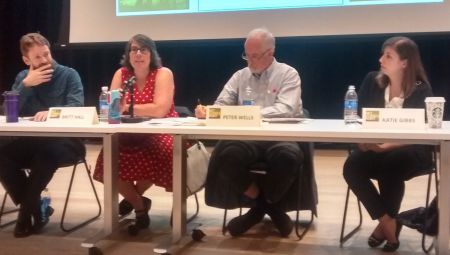KJIPUKTUK (HALIFAX) – No one, including Katie Gibbs, expected science to become a federal election issue.
Gibbs is the Executive Director of Evidence for Democracy. Speaking to a packed auditorium at Halifax’s Central Library on Tuesday, Gibbs said the amount of interest in the muzzling of federal scientists and cuts to federal science agencies in Canada has been surprising on more than one occasion.
In 2012, when Gibbs – then a graduate student – helped to organize a ‘death of evidence’ march in Ottawa, she expected 500 scientists to attend.
Nearly 3000 turned up.
It’s a level of interest that reflects the seriousness of the issue.
“The cuts have been really grievous,” said Dr. Tom Duck, a professor in Atmospheric Science at Dalhousie who was also speaking on Tuesday’s panel.
Much of Duck’s career has been spent in the High Arctic, including at the pioneering PEARL research station, which was instrumental in conducting ozone research and testing climate models. That lab’s funding was pulled in 2012, although funding was partially restored in 2013.
It was nominally replaced by the Canadian High Arctic Research Station, which Duck noted is essentially dedicated to resource exploration.
The undermining of science in the public interest is a serious problem, said Peter Wells, a former aquatic toxicologist with Environment Canada. Wells is retired, but you wouldn’t know it – he’s one of several volunteer scientists who monitor for trace chemicals in the Bay of Fundy, the only group that does so.
That alone is indicative of the state of science funding, he said.
“We should have been replaced long ago.”
Budget cuts aren’t unique to the Harper government – in the 1990s, he said, the Liberals cut their fair share of science funding too. But current federal government practices are motivated by an ideology of small government – a government that is at war not only with science, but with the public sector in general.
It’s the same ideology that prompts government to make science policy more agreeable to the goals of industry, said Duck, including quashing scientific research when it interferes with those ends.
“The easiest way to end the discussion is to eliminate scientists’ ability to speak.”
It isn’t just federal scientists that have been muzzled in the media; Department of Fisheries and Oceans libraries have been closed and their contents liquidated, representing a permanent loss of research, said Wells.
Entire agencies have also been rebranded, said Duck, pointing to the National Research Council (the NRC).
For much of the 20th century, the NRC was Canada’s primary science funding body; in 2013, NRC President John MacDougall declared that “scientific discovery is not valuable unless it has commercial value” and the NRC was given a new label: concierge of industry.
A 2007 science and technology strategy document by the Harper government reflects a similar bent, stating that the strategy “recognizes that the most important role of the Government of Canada is to ensure a free and competitive marketplace, and to foster an investment climate that encourages the private sector to compete against the world on the basis of their innovative products, services and technologies. The government also has a role in supporting research and development that is the basis for…improved lives, better jobs, and new business opportunities.”
Although the damage done to public science under the Conservative government’s tenure has been extensive, there have been victories.
The Experimental Lakes Area (ELA), a facility that has done essential research on phenomena such as the effect of phosphates in detergents and the impact of acid rain, was nearly closed in 2013 when its federal funding was canceled.
But both the scientific community and the public at large rallied around, and the facility was saved, having been brought under the umbrella of a non-profit organization.
“That was a catalyst for this debate,” said Britt Hall, an academic at the University of Regina and former director of Save ELA.
That catalyst has been part of a groundswell that’s brought science to the fore in the federal election.
The Liberals, the NDP and the Greens have all committed to the un-muzzling of scientists, the reinstatement of the long form census, and the establishment of a voice for science within the government, said Gibbs. But even if the election brings about a change in party, the work won’t be over.
Science arises, after all, in a political context – if the kind of science that’s considered valuable is to change, then the nature of politics will have to shift too. If Canadians want politicians to value science in the public interest, said Gibbs, they’ll have to demand it.
“We need people to ask for evidence…ask the government to show their work. It’s a small thing but it’s a huge change.”



